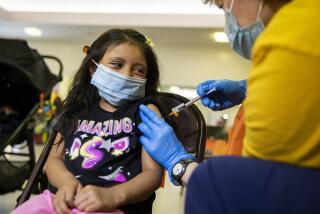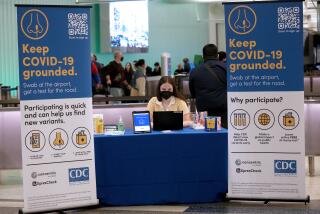Omicron brought ‘more severe disease in kids’; 2 Orange County teens died this month

The Omicron surge resulted in hospitals in Orange County seeing more severe illness in children, officials said, a finding reflected across the nation.
Two teenagers who lived in Orange County died from COVID-19 this month, officials said this week, including one who was previously healthy and hadn’t been vaccinated.
There have been a total of five pediatric COVID-19 deaths among residents of Orange County, California’s third-most populous county, since the pandemic began two years ago. Three of the deaths have occurred since December.
“We’ve certainly seen illness in kids from the start of this pandemic. But during this surge of Omicron, we really saw more illness in kids and more severe disease in kids,” Dr. Matthew Zahn, an Orange County deputy health officer who is also a pediatric infectious disease expert, said in a video discussion Tuesday night.
“If you look at what happened in the Children’s Hospital of Orange County … and really children’s hospitals around the country, this surge was really their worst surge,” Zahn said. “For us in Orange County, in terms of kids not only getting sick, but getting hospitalized, this surge was the worst.”
In past surges, teenagers who were severely obese were more likely to have serious COVID-19 disease, Zahn said. But in the Omicron surge, “we saw otherwise healthy young kids under 3 years of age [with no] underlying health conditions — otherwise perfectly healthy — still would get sick and end up in the hospital,” Zahn said.
A big factor in the increase in pediatric hospitalizations nationwide this winter was the soaring number of new infections from the ultra-contagious Omicron variant, according to the Children’s Hospital Assn.
Even though many people who get infected with COVID-19 recover without hospitalization, the extraordinary number of simultaneous infections — far greater than at any previous point in the pandemic — has been a factor in the total number of pediatric hospitalizations.
“Omicron has proven to be the most contagious COVID-19 variant of the pandemic so far. The main difference with Omicron is the sheer number of kids getting sick at the same time,” Dr. Natasha Burgert, a pediatrician in Kansas, wrote for an American Academy of Pediatrics website.
Omicron owes its ultra-contagiousness to its prowess at infecting the upper respiratory system, and that could pose a problem for children, Dr. Scott Gottlieb, a former commissioner of the U.S. Food and Drug Administration, told CBS’ “Face the Nation” last month.
Toddlers, Gottlieb said, “have trouble with upper airway infections .… So, that could be a challenge for young kids, and we are seeing rising hospitalizations among that pediatric segment.”
A report published by the U.S. Centers for Disease Control and Prevention this month found that, amid increased circulation of the Omicron variant, COVID-associated hospitalization rates among those under age 18 increased rapidly in late December, especially among those 4 and younger who are ineligible for vaccination.
The report added that during the Omicron surge, COVID-related hospitalization rates were lower among fully vaccinated adolescents age 12 to 17 compared with their unvaccinated peers. In December, unvaccinated adolescents had a monthly hospitalization rate that was six times that of adolescents who were fully vaccinated, “suggesting that vaccines were highly effective in preventing serious COVID-19 illness.”
“Although COVID-19–associated hospitalizations are more frequent among adults, COVID-19 can lead to severe outcomes in children and adolescents,” the report said.
The report said COVID hospitalization rates among children and adolescents during the Omicron surge were four times as high as rates during the summer Delta wave.
The Omicron surge resulted in the highest number of coronavirus-positive children hospitalized compared with prior surges in Orange County.
At one point in January, there were 15 patients battling COVID-19 at Children’s Hospital of Orange County, the “highest number ever”, with 14 in intensive care, Dr. Clayton Chau, director of the Orange County Health Care Agency and the county’s health officer, said at the time.
Chau referenced the story of one father, who recently spoke publicly about the death this month of his previously healthy 17-year-old daughter. She declined the vaccine despite the efforts of the father and his wife to encourage her to get vaccinated, the father said in an interview with KCBS-TV. The TV station reported that the teenager suffered from multisystem inflammatory syndrome, a deadly complication of COVID-19.
The first pediatric patient to die of COVID-19 in Orange County, reported in August 2020, was a teenage girl with underlying health condition; the second was a child under 5 in August 2021. A third child died in December; that child was previously in good health, was under 5 and thus ineligible to receive a vaccination.
Across California, 52 children under 18 have died of COVID-19. Los Angeles County has reported eight pediatric deaths.
Even before the Omicron surge, data was emerging that COVID-19 had become one of the leading causes of death in children nationwide.
There were 66 COVID-related deaths among children 5 to 11 in the year that ended Oct. 2, according to the CDC.
Among those under 18, there have been more than 1,400 COVID-19 deaths nationwide since the start of the pandemic, according to the CDC.
Health officials have voiced concerns about lower rates of vaccination among children and teenagers compared with adults. Among California’s children age 5 to 11, only 37% are considered fully vaccinated, while 73% of adolescents and teens age 12 to 17 are fully vaccinated.
By contrast, 87% of California adults up to age 49 are fully vaccinated; as are more than 90% of older adults, according to the California Department of Public Health.
Lilly Nguyen of the Daily Pilot contributed to this report.
More to Read
Sign up for Essential California
The most important California stories and recommendations in your inbox every morning.
You may occasionally receive promotional content from the Los Angeles Times.












